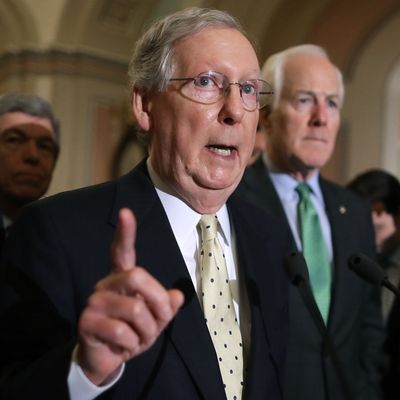
During the course of its history as a hotly contested piece of legislation, then a polarizing law, the Affordable Care Act has flirted with death more often than James Bond. Now it finds itself in the crosshairs once again.
Politico reported on Sunday that Senate Majority Leader Mitch McConnell has said he is “seriously considering” holding a vote on a bill sponsored by Senators Lindsey Graham and John Cassidy that would dramatically shift the funding of America’s health care from the federal government to individual states while gutting key provisions of the Affordable Care Act.
Just days ago, Republican senators had roundly dismissed the bill’s chances. But earlier in the week, Cassidy claimed he had up to 49 Republican votes lined up (though others suspect the number was lower). And Senator Graham has been somewhat successful in his efforts to rally President Trump, who had seemed disengaged with earlier Obamacare repeal endeavors:
Graham has publicly begged for Trump to help build support for the bill, and it appears to be paying off. The president asked about the Graham-Cassidy proposal in conversations this weekend in Bedminster, New Jersey, and is likely to call senators this week while he is in New York at the United Nations, the administration official said, though much of the work will be done on the senior staff level.
This time around, the GOP has a hard deadline: September 30, which the chamber’s parliamentarian has ruled is the last day this year that senators can use the budget-reconciliation process to pass legislation with only 50 votes. If Republicans did manage to pass the bill before then, the House would have to approve it as-is, since the Senate could not revise text after the deadline.
Graham-Cassidy, as it’s known, is far more ambitious than Republicans’ last attempt at killing the Affordable Care Act, dubbed a “skinny repeal,” which came within one vote of passing the chamber in July. The new bill is a veritable parade of horribles: It would replace the subsidies that are a key part of Obamacare with block grants, nix the individual mandate, end federal protections for preexisting conditions, and much more. (And no, it doesn’t come close to passing the so-called “Jimmy Kimmel Test” Cassidy proposed as a standard of health care during a fleeting moment of compassion in May.)
As before, getting to 50 will be a steep climb. If any three Republicans vote no, the bill is toast, and if McConnell knows the bill won’t reach that level of support, he probably won’t bring it to the Senate floor, assuming he wants to avoid another humiliating spectacle like the one in July.
Rand Paul, the Senate’s resident crank, has already said he can’t support the bill, calling it “Obamacare lite.” (He made similar noises on the previous repeal effort, though, and ended up coming around.)
John McCain, whose famous thumbs-down nixed the skinny-repeal effort in dramatic fashion, again protested the partisanship of McConnell’s legislative strategy on Sunday, endorsing the approach of Senators Lamar Alexander and Patty Murray, who have recently held bipartisan hearings on how to stabilize the Affordable Care Act marketplaces.
Maine’s Susan Collins and Alaska’s Lisa Murkowski, two moderates who also voted against skinny repeal, have not taken a position on Graham-Cassidy. But their steadfastness in the face of overwhelming pressure to vote yes in July is not a good sign for Republicans, and Politico reported that Collins said “the Planned Parenthood defunding is problematic.”
Democrats and liberal activists have started to rally in earnest against the bill, though the miniscule amount of coverage it has received, after so many prior Obamacare-repeal news cycles, likely works in the GOP’s favor.
And then there’s the Congressional Budget Office, which will release an expedited score on the legislation at some point between now and September 30. However, the CBO announced on Monday that the score would reveal only the budgetary impact of the bill, not the expected health-care coverage loss. Whether Republicans would make the unprecedented move of voting on a massive piece of legislation without really understanding its effects on the insured remains to be seen, but there are some indications that they might take that radical step.
So, Republicans have a very long way to go in a short period of time to achieve their dream of exploding America’s health-care system. But it can, and just might, happen. In any case, we’ll soon know if the Affordable Care Act can survive its latest near-death experience.
This piece has been updated to reflect the Congressional Budget Office’s statement on Monday.






























